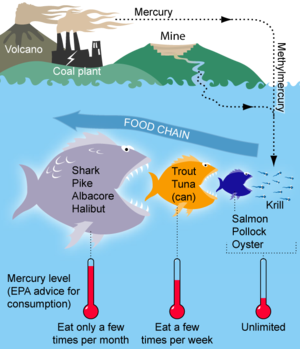Canned tuna has always been
one of my favorite survival foods: It tastes good, stores for ages and you can
eat it straight out of the can without cooking. It packs a lot of protein and
calories when in sunflower oil, and it goes along nicely with staples such as
rice and pasta.
When times were hard back in
Argentina and we really couldn’t afford all that much, some rice along with a
bit of vegetables and tuna made for a nice meal.
It was only later on that I
learned about how fish can accumulate mercury and that it can be bad for you
when ate in excess. We never ate that much because it was always mixed with
something else, but especially for pregnant women and children, it’s a good
idea to keep an eye on the amount of tuna intake. In general it is not
recommended to eat more than a can (about 130gr) per week.
What about other fish food
and seafood? In general, the longer the animal lives, and the higher it is on
the food chain, the more mercury it has accumulated.

This website will give you a
good idea of how much seafood is a safe amount:
Tuna has high levels of mercury
compared to cod and salmon for example, so it’s a good idea to go for those
when possible. Every now and then canned salmon can be found. When you come
across a good deal for it, consider stocking up.
Taking care not to eat too
much of it and being informed about which fish have more mercury will allow us
to keep a safe, balanced diet.
FeFAL








2 comments:
We are also concerned about wild caught salmon in the pacific due to Fukushima. Then there is GMO salmon. Although seafood from the Gulf (of Mexico) shows up in our grocery store seafood department, We will not buy it.
We stopped buying corn and corn products. We reduce our wheat use as much as possible and use substitutes.
There are many concerns about what has been done to our food supply. There is a lot to be concerned about when purchasing food.
Anon: Be much more concerned about the level of food silliness that you are displaying with your concerns about "GMO salmon" and corn.
You are at far more risk from bacterially contaminated meat because the local butcher didn't wash his hands well enough after using the bathroom, or toxic molds growing on improperly-stored grains in your storage cache.
Post a Comment